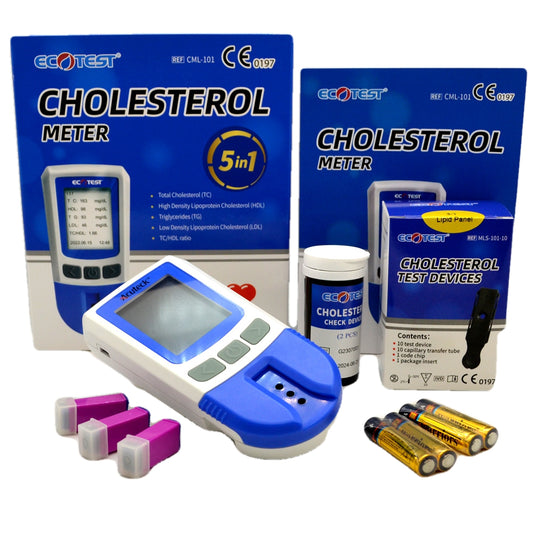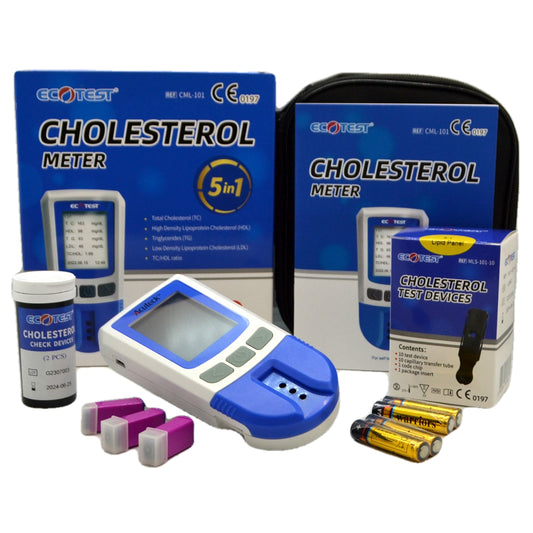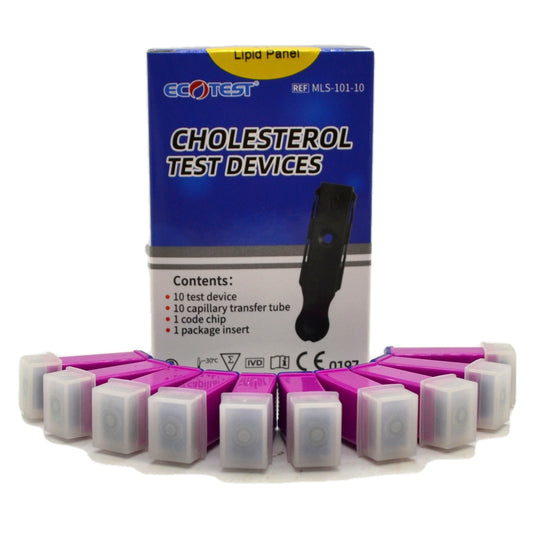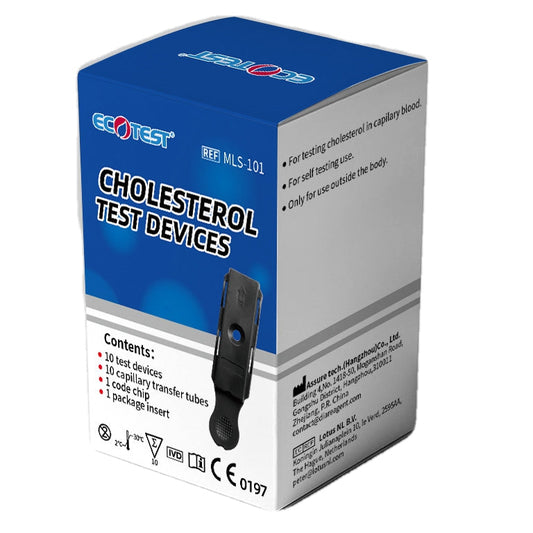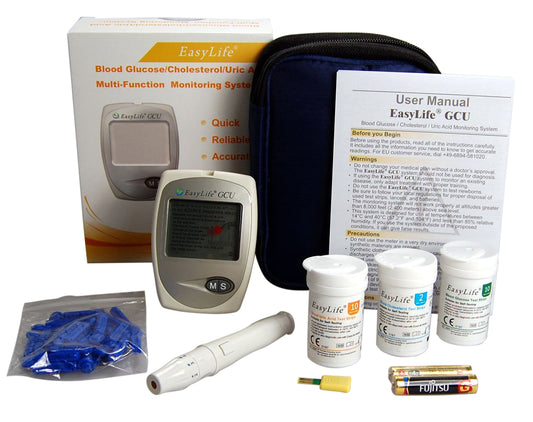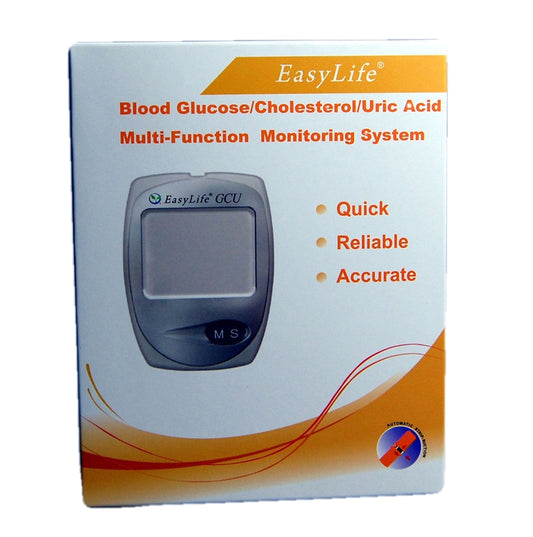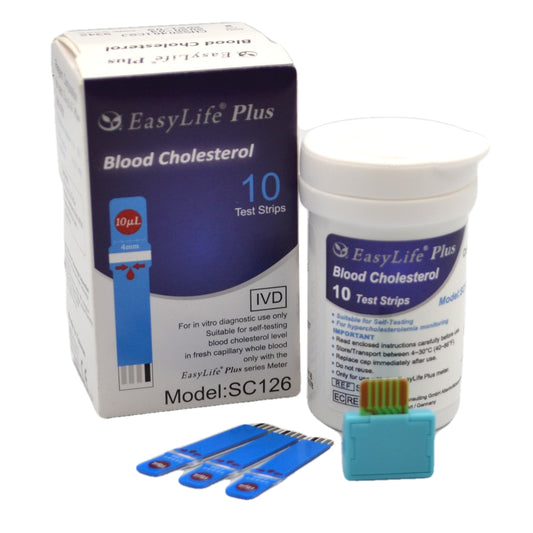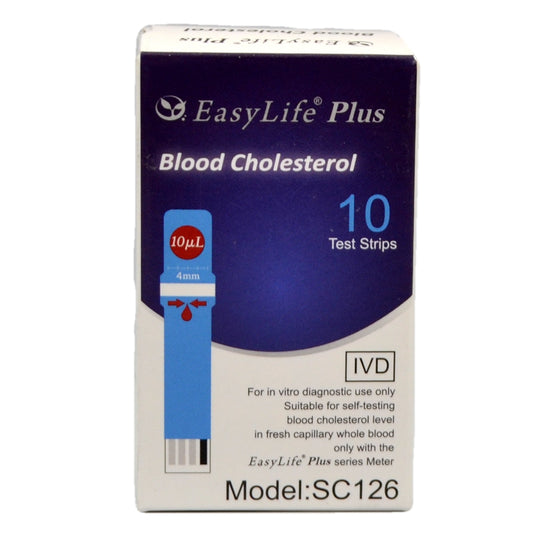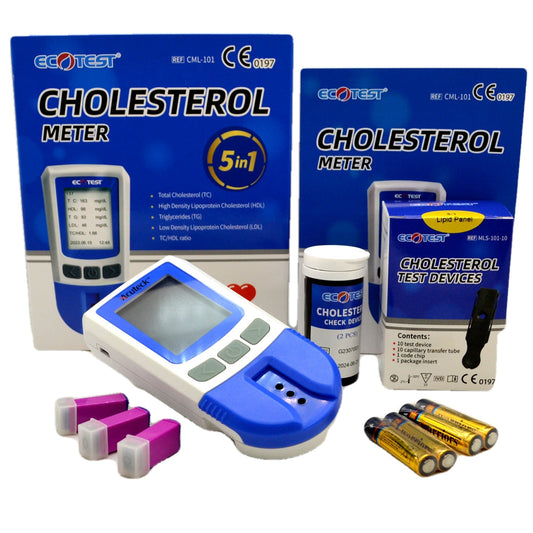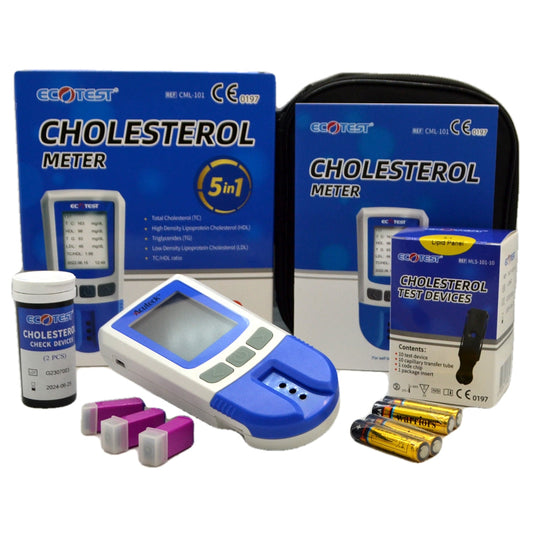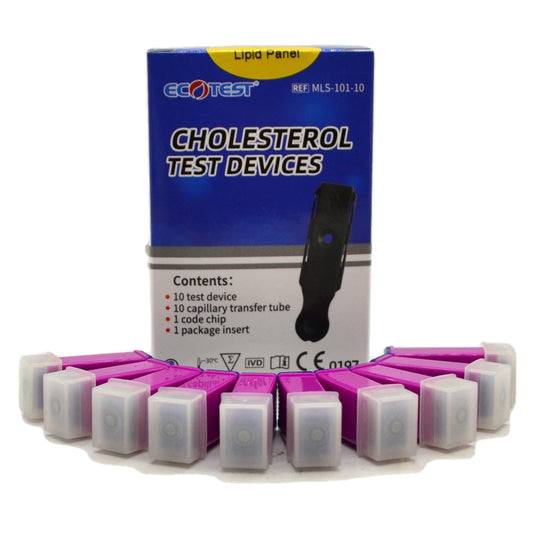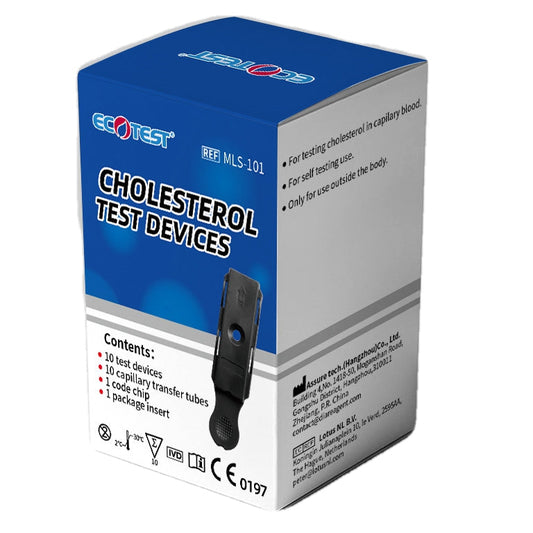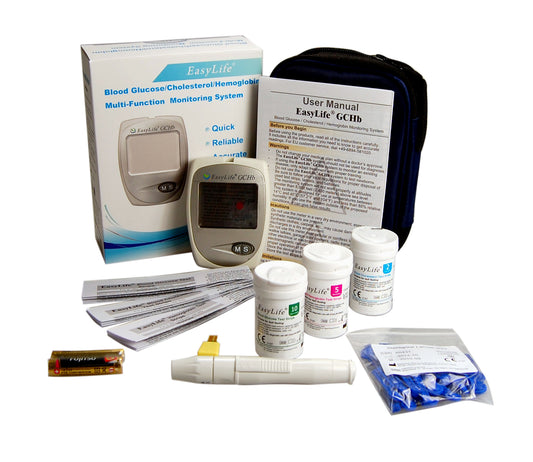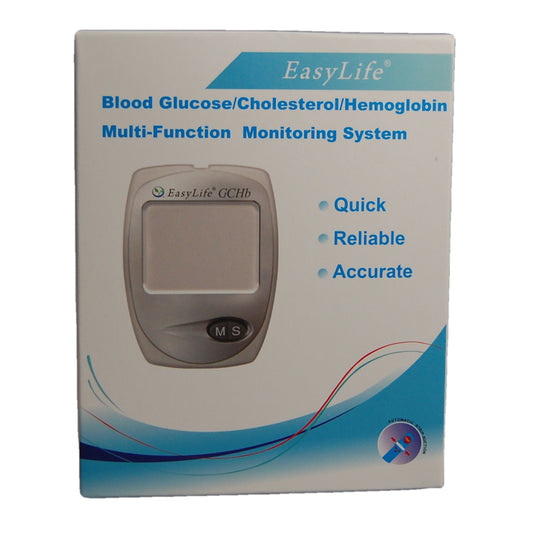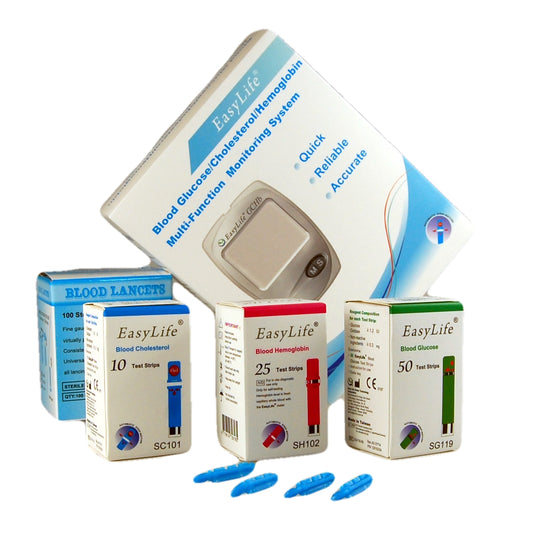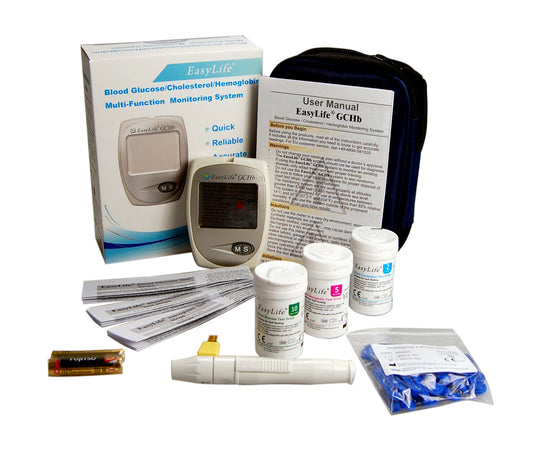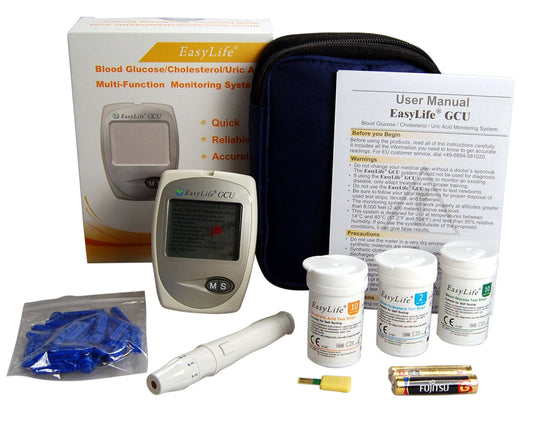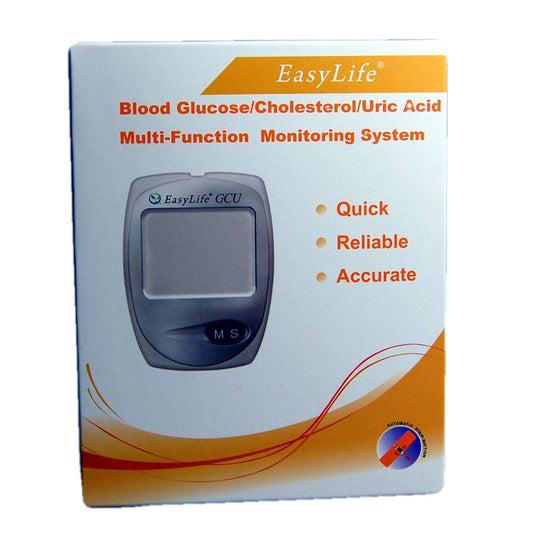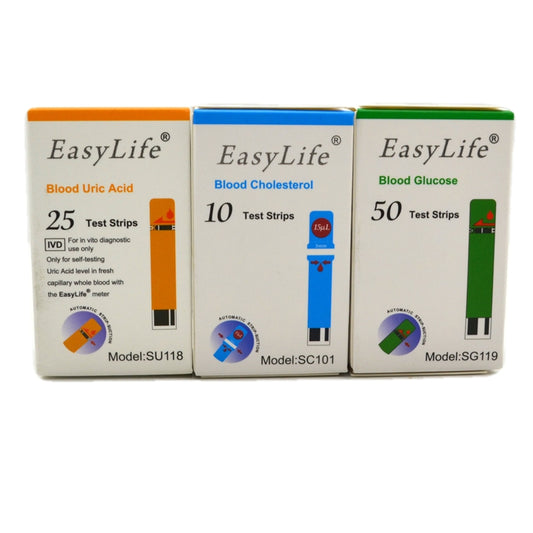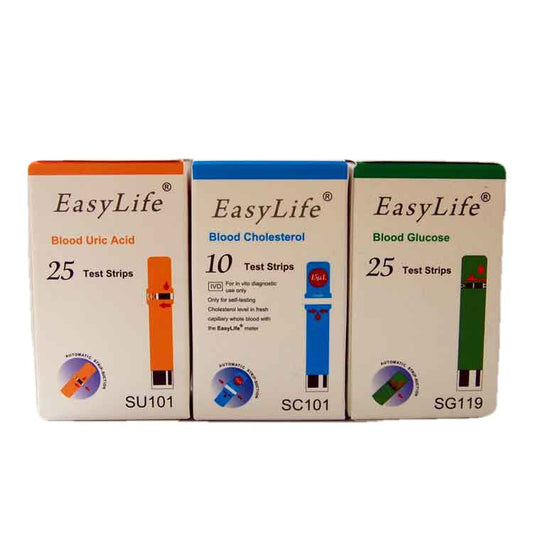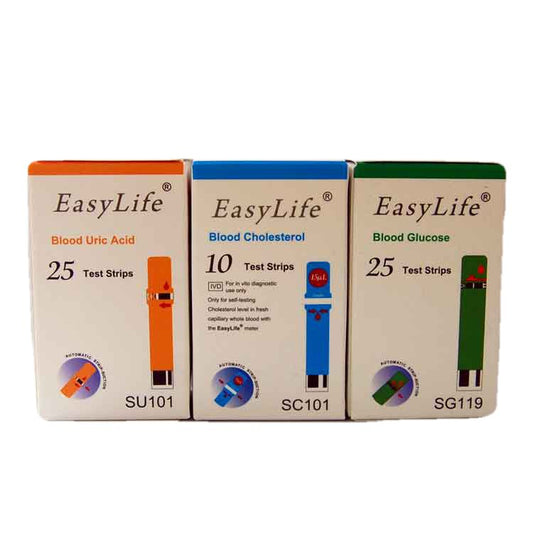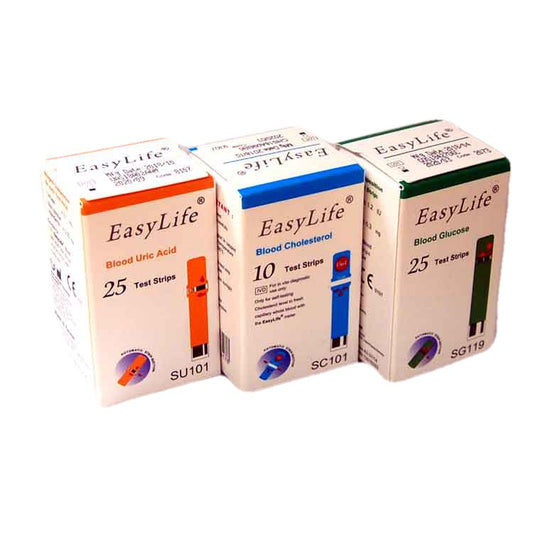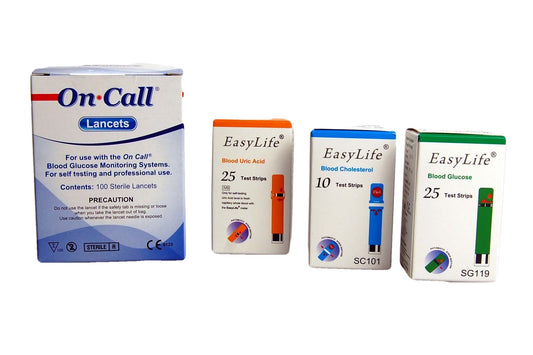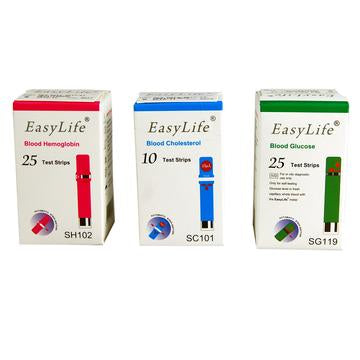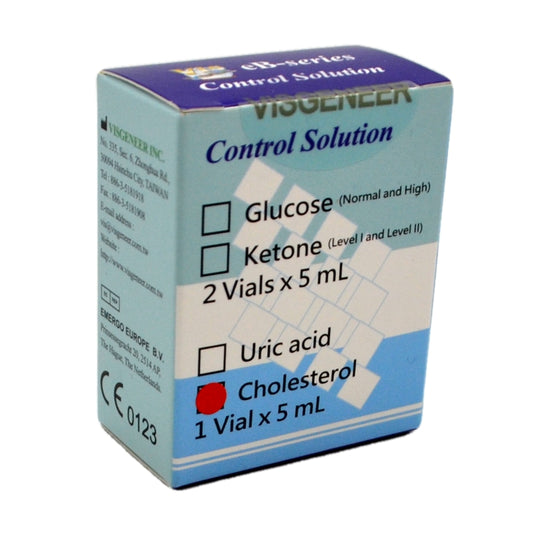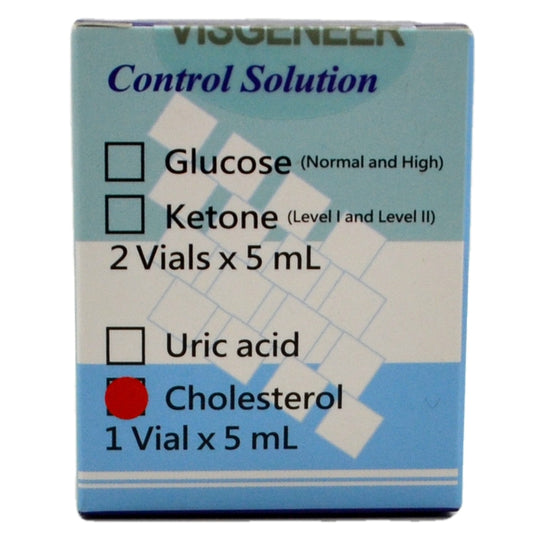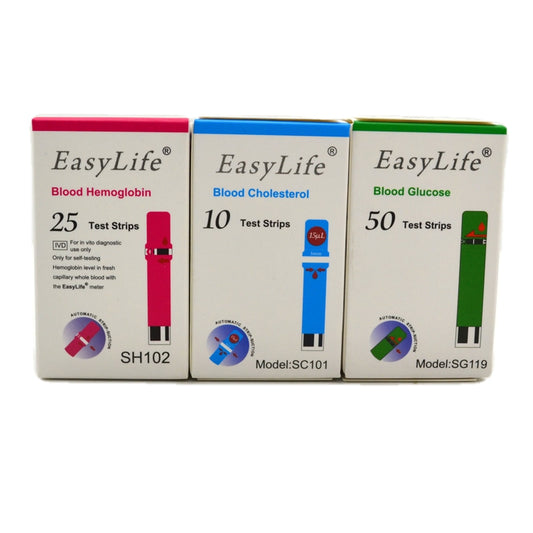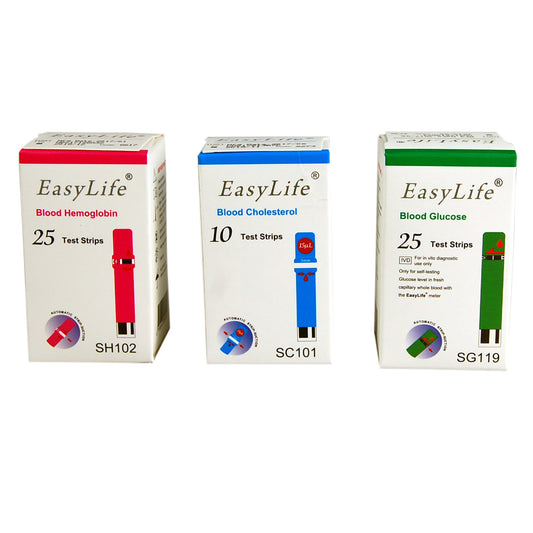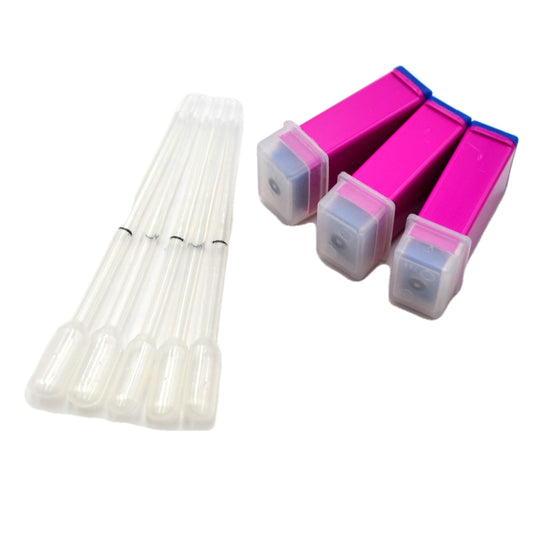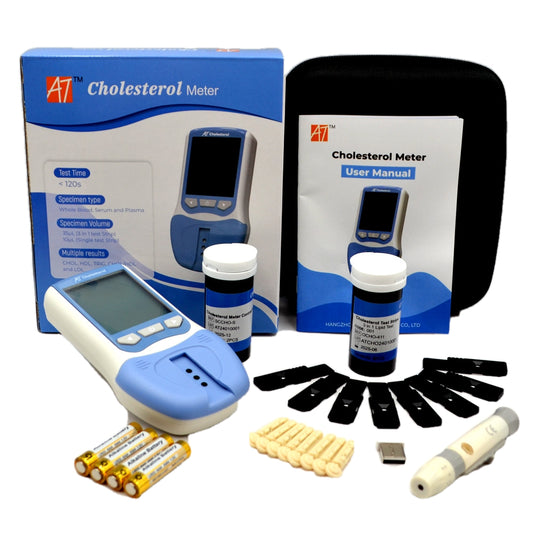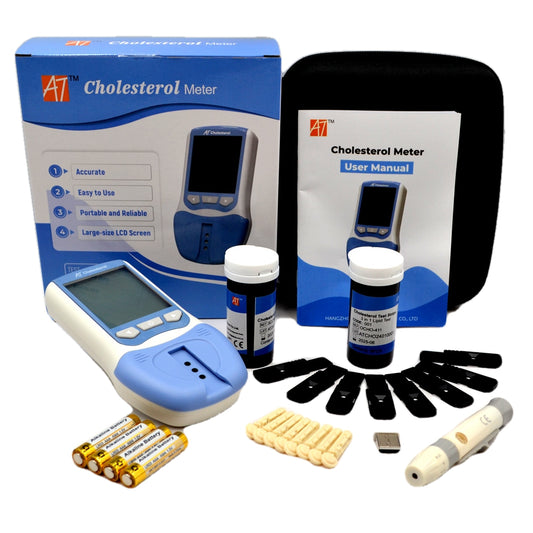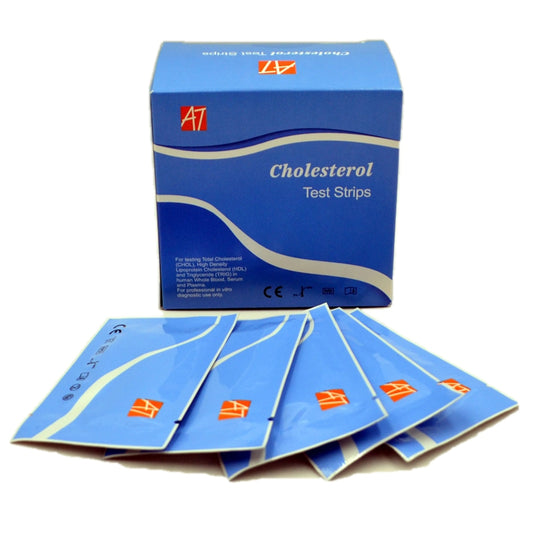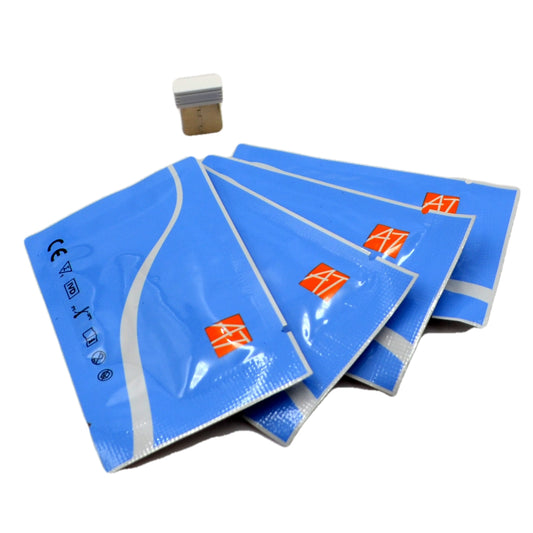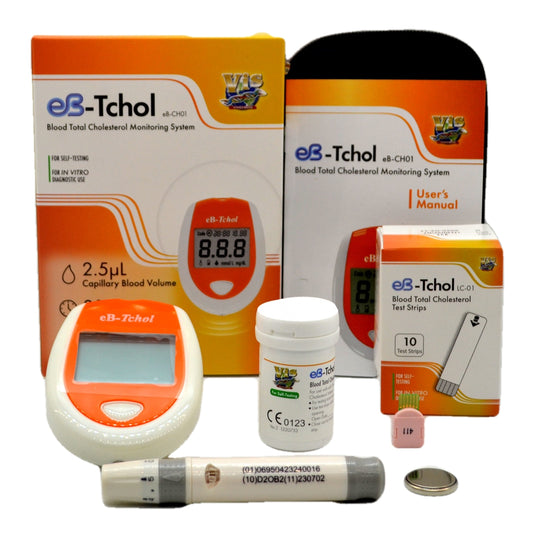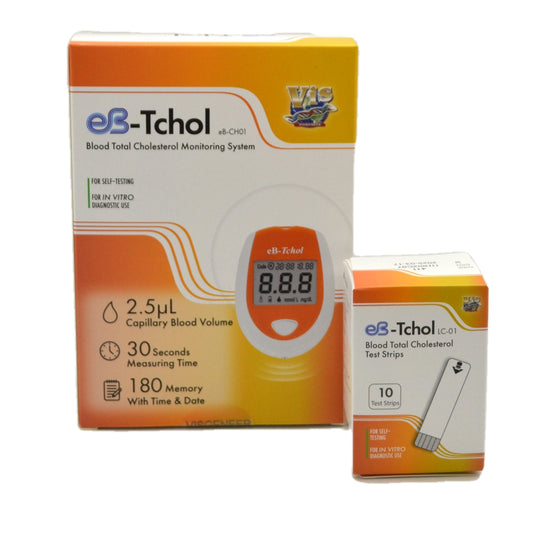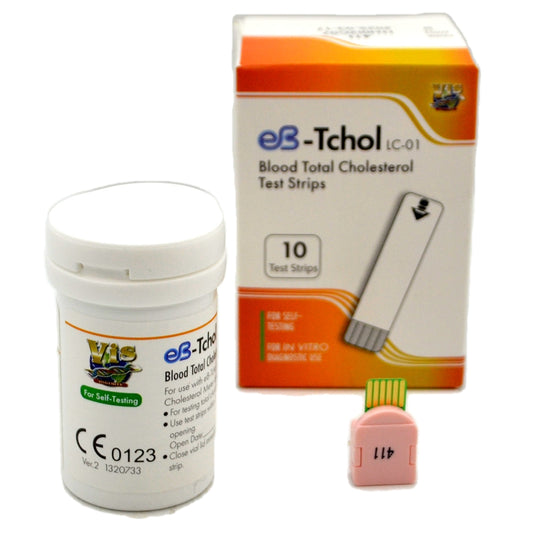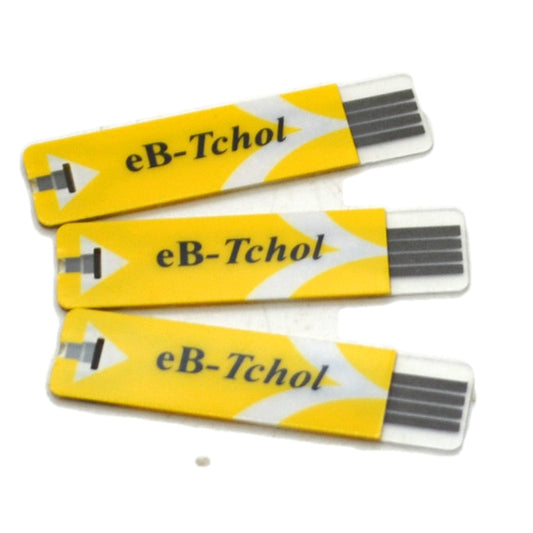Collection: Cholesterol Meters and Cholesterol Test Strips
-
EcoTest 5 in 1 Home Cholesterol Meter + 10 Home Cholesterol Tests
5.0 / 5.0
(5) 5 total reviews
Regular price £159.99 GBPRegular priceUnit price / per -
10 EcoTest Cholesterol Test Devices + Safety Lancets + Pipettes
5.0 / 5.0
(1) 1 total reviews
Regular price £34.99 GBPRegular priceUnit price / per -
EASYLIFE GCU Blood Glucose / Cholesterol / Uric Acid Meter
5.0 / 5.0
(2) 2 total reviews
Regular price From £49.99 GBPRegular priceUnit price / per -
10 EASYLIFE PLUS Blood Cholesterol Test Strips
3.67 / 5.0
(3) 3 total reviews
Regular price From £18.59 GBPRegular priceUnit price / per -
EcoTest 5 in 1 Cholesterol Meter + 50 Cholesterol Test Devices
5.0 / 5.0
(1) 1 total reviews
Regular price £289.99 GBPRegular priceUnit price / per -
50 EcoTest Cholesterol Test Devices + Safety Lancets + Pipettes
5.0 / 5.0
(1) 1 total reviews
Regular price £164.99 GBPRegular priceUnit price / per -
EASYLIFE Blood Glucose / Cholesterol / Haemoglobin Meter
Regular price From £47.99 GBPRegular priceUnit price / per -
FREE EASYLIFE Blood Glucose / Cholesterol / Haemoglobin Meter With Strips and Lancets Offer
Regular price £51.78 GBPRegular priceUnit price / per£101.77 GBPSale price £51.78 GBPSale -
EASYLIFE Blood Glucose / Cholesterol / Uric Acid Meter + 25 Uric Acid Test Strips
5.0 / 5.0
(1) 1 total reviews
Regular price £59.99 GBPRegular priceUnit price / per -
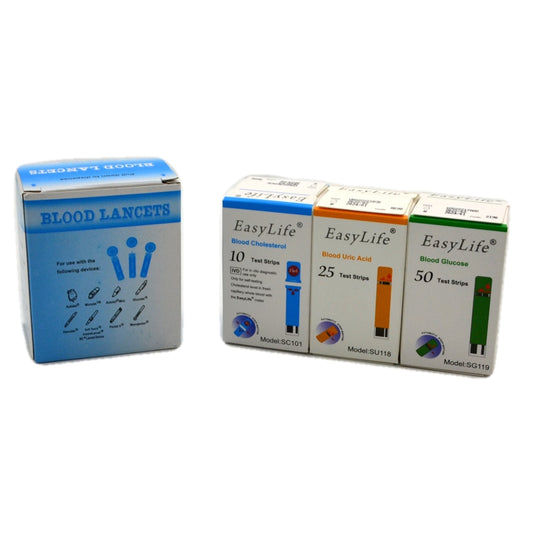
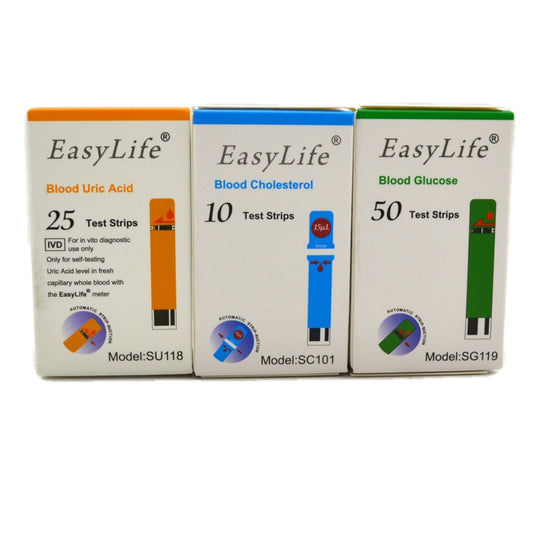
Easylife Test Strips Bundle Pack-50 Glucose / 10 Cholesterol / 25 Uric Acid + 100 Universal Lancets
Regular price £46.04 GBPRegular priceUnit price / per£51.52 GBPSale price £46.04 GBPSale -
Easylife 50 Glucose / 10 Cholesterol / 25 Uric Acid Test Strips Bundle
Regular price £44.04 GBPRegular priceUnit price / per£46.53 GBPSale price £44.04 GBPSale -
Easylife 25 Glucose / 10 Cholesterol / 25 Uric Acid Test Strips Combo Pack
Regular price £39.99 GBPRegular priceUnit price / per£42.48 GBPSale price £39.99 GBPSale -
Easylife Glucose / Cholesterol / Uric Acid Strips Combo Pack + 100 Universal Lancets
Regular price £41.99 GBPRegular priceUnit price / per£47.47 GBPSale price £41.99 GBPSale -
Easylife Glucose / Cholesterol / Haemoglobin Strips Combo Pack
Regular price £39.99 GBPRegular priceUnit price / per£42.48 GBPSale price £39.99 GBPSale -
eB-Tchol Cholesterol Control Solution Pack
5.0 / 5.0
(1) 1 total reviews
Regular price £9.99 GBPRegular priceUnit price / per -
Easylife Test Strips Bundle Pack-50 Glucose, 10 Cholesterol, 25 Haemoglobin
Regular price £43.08 GBPRegular priceUnit price / per£47.13 GBPSale price £43.08 GBPSale -
Easylife Test Strips Blood Glucose / Cholesterol / Haemoglobin Combination Pack
Regular price £40.99 GBPRegular priceUnit price / per£43.08 GBPSale price £40.99 GBPSale -
10 Spare Safety Lancets + Pipettes for use with EcoTest Cholesterol Test Devices
Regular price From £4.99 GBPRegular priceUnit price / per -
AT Cholesterol 5 in 1 Meter + 8 Home Cholesterol Tests by Valuemed
Regular price £139.99 GBPRegular priceUnit price / per -
20 AT 3 in 1 Cholesterol Test Devices + Pipettes for the AT Cholesterol 5 in 1 Meter
Regular price £69.99 GBPRegular priceUnit price / per -
eB-Tchol Total Home Cholesterol Meter + 10 Cholesterol Tests
5.0 / 5.0
(1) 1 total reviews
Regular price £39.99 GBPRegular priceUnit price / per -
eB-Tchol 10 Total Cholesterol Tests Refill Pack
5.0 / 5.0
(1) 1 total reviews
Regular price From £16.99 GBPRegular priceUnit price / per
Cholesterol test at home
We have 3 Cholesterol meter and tests strip options including Total Cholesterol, HDL LDL & Triglyceride Self-Testing Meters and devices for accurate cholesterol level testing in the blood, and allow you to test your cholesterol at home. They are also suitable for professional use. These cholesterol testing devices work by using a small amount of blood from a fingerstick to measure the levels of total cholesterol.
Choosing a home cholesterol test kit and meter
We hope you find this video helpful in helping you decide which cholesterol test kit best suits your needs. If you don't have time to watch the video there is more information below.
How does a home cholesterol test kit work?
Ther are two main types of cholesterol meter and test strips to choose from including simple total cholesterol, or a complete HDL LDL Triglyceride and ratio testing. All are small handheld devices that are battery-powered and have a digital display screen. They have to be used with cholesterol test strips, which are small pieces of paper or plastic that are coated with a chemical that reacts with cholesterol in the blood. The user inserts the cholesterol test strip into the cholesterol meter and pricks their finger to obtain a small drop of blood, which is then placed onto the test strip. The meter then measures the amount of cholesterol in the blood and displays the result on the screen. To get an accurate result with any of the home cholesterol test kits, you must first obtain a good blood sample from the finger prick.
Who are home cholesterol tests suitable for?
Cholesterol meters and strips are often used by people who want to monitor their cholesterol levels at home. It is important to note that these devices should not be used as a substitute for professional medical advice and treatment. If you are concerned about your cholesterol levels, you should consult with your healthcare provider who can perform a more comprehensive cholesterol test and provide guidance on how to manage your cholesterol levels.
They are also very useful tools for individuals who are already known to have abnormal cholesterol levels, and who wish to monitor their cholesterol levels at home, and see how they respond to dietary changes.
Which is the best cholesterol meter and test kit?
Our range of Cholesterol test kits and meters can be sorted into:
- Total Cholesterol Tests (eBTcho, EasyLife) Total Cholesterol tests cost less per test and are fine for general screening for raised cholesterol levels in blood and for monitoring normal cholesterol levels. You can screen total cholesterol at any time of day.
- Differential Cholesterol Tests (EcoTest 5 in 1 cholesterol meter) This is the best cholesterol meter if you want a more detailed breakdown of your cholesterol and lipid levels as it measures Total Cholesterol (TC) , High Density Lipoprotein (HDL) and Triglycerides (TG) and then the meter calculates the ratio of Total Cholesterol (TC) to HDL and Low-Density Lipoprotein Cholesterol (LDL) so 5 results are given on every blood sample. It is an ideal choice if you are monitoring elevated total cholesterol levels and/or high Triglyceride levels. If you have elevated Cholesterol, or are on diet modifications or medication to treat elevated cholesterol, our advice would be to buy the 5 in 1 EcoTest system, which will measure the full blood lipid profile and will give you far more detailed information about your cholesterol levels.
Collapsible content
Are home cholesterol tests accurate?
While home cholesterol test kits can provide reasonably accurate results, they may not be as precise as laboratory tests. Factors such as user error, sample collection, and test kit quality can influence accuracy.
Why should I use a cholesterol test kit?
Cholesterol test kits offer convenience, allowing you to check your cholesterol levels at home without visiting your doctor or a healthcare facility. Regular monitoring is essential for individuals with a history of high cholesterol or those on cholesterol-lowering medications.
It's often recommended for regular monitoring of cholesterol levels, especially if you have a family history of heart disease or if you're managing your cholesterol through lifestyle changes or medications.
How do cholesterol test kits work?
A cholesterol test kit is a home diagnostic tool designed to measure the levels of cholesterol in your blood. It typically includes test strips, a lancet for blood collection, and a device (cholesterol meter) to analyse the blood sample.
These home cholesterol kits usually use a small blood sample, often obtained through a fingerstick. The blood is applied to a test strip, which. is then inserted into the meter which analyses the sample to provide blood cholesterol level readings.
Should I do a fasting or non-fasting cholesterol test?
If your Total Cholesterol levels are in the normal range there is usually no need to test after fasting.
However, if your results indicate an elevated total cholesterol or high level of Triglycerides, over 1.7 mmol/L, then it is best to move to cholesterol testing after fasting for between 9 and 12 hours. This can easily be achieved by not eating after 7 pm and testing first thing the following morning.
How to interpret your EcoTest Cholesterol Test Results
Ecotest Cholesterol Meter Results
The Ecotest Cholesterol meter displays 5 results for each completed blood test. Results are displayed in one of 2 scale options you can select, mmol/L or mg/dL. In the UK most cholesterol level results will be given in mmol/L.
Below are the minimum and maximum levels that the ecotest cholesterol meter is able to measure
- Total Cholesterol : 2.59-12.93 mmol/L (100-500 mg/dL )
- HDL Cholesterol : 0.39-2.59 mmol/L (15-100 mg/dL)
- LDL Cholesterol : 2.20-10.43 mmol/L (85-400 mg/dL)
- Triglycerides : 0.51-7.34mmol/L (45-650 mg/dL)
- Ratio of Total Cholesterol to HDL
Total Cholesterol
A normal Total Cholesterol level is below 5.0 mmol/L (200mg/dL) Above 5.0 but below 6.18 mmol/L is considered borderline elevated. Above 6.20mmol/L is considered high.
A high total cholesterol level can increase your risk of cardiovascular disease. However, decisions about when to treat high cholesterol are usually based upon the level of LDL or HDL cholesterol rather than the level of total cholesterol.
Total cholesterol levels can be tested at any time of day but the LDL and Triglyceride levels can vary depending on what has been recently eaten. For this reason, fasting (9-12hr) total cholesterol measurement is preferred by most doctors where either of the above two is elevated.
HDL
HDL or High-Density Lipoprotein is a good element and levels of over 1.55mmol/L (60mg/dL) are excellent. Levels between 1.00 mmol/L and 1.55 mmol/L are normal. Below 1.0 mmol/L are unhealthy. Men tend to have lower HDL levels than women 1 versus 1.2 mmol/L an ideal to aim for is 1.4 mmol/L
LDL
LDL or Low-Density Lipoprotein Cholesterol often referred to as bad cholesterol increases cardiovascular disease risk and Levels should be kept below 3.0 mmol/L
Triglycerides
High triglyceride levels are also associated with an increased risk of cardiovascular disease.
Triglyceride levels are assessed as follows:
●Normal – Less than 1.7 mmol/L (150 mg/dL)
●Mildly increased – 1.7 to 5.6 mmol/L (150 to 499 mg/dL)
●Moderately increased – 5.6 to 10 mmol/L (500 to 886 mg/dL)
●Very high – Greater than 10 mmol/L (886 mg/dL)
If your Cholesterol levels are abnormal we can not give personal or medical advice, so please discuss the findings with your Doctor, Nurse, or Pharmacist.

